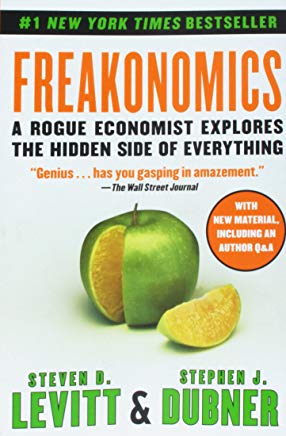

This article is an excerpt from the Shortform summary of "Freakonomics" by Steven Levitt and Stephen Dubner. Shortform has the world's best summaries of books you should be reading.
Like this article? Sign up for a free trial here .
Would you like to understand your fellow humans better? When is conventional wisdom wrong? What if you thought like an economist?
Authored by Steven D. Levitt and Stephen J. Dubner, Freakonomics: A Rogue Economist Explores the Hidden Side of Everything applies the tools of economics to explain real-world phenomena that aren’t conventionally thought of as “economic.” The book contains fascinating implications and applications.
Continue reading for discussion questions and a quiz that you can use with your Freakonomics book club.
Freakonomics: Book Club Exercises & Quiz
Freakonomics argues that data analysis and incentives can explain a lot about human behavior and that a great deal of what experts and conventional wisdom tell us is wrong. As they explore these themes, the authors give us some powerful—and highly counterintuitive—insights into why the world is the way it is.
Use these seven exercises and the quiz to generate discussion and test your knowledge at your Freakonomics book club meeting.
Exercise #1: Identify the Incentive
If you define the incentive in a situation, you’ll better understand human behavior.
- A bank decides to increase its profit margins and motivate its workforce by creating a new incentive program. Employees receive bonuses for having customers open new accounts or sign up for additional products and services. Employees are also threatened with termination if they do not meet predetermined quotas assigned by management. Describe how this incentive structure could end up encouraging bad or unethical behavior.
- In your workplace or personal life, do you see any economic incentives that are unintentionally leading to bad behavior? Describe the situation:
- What is the incentive
- What is the intended effect
- What bad behavior is it encouraging?
- In society, social and moral incentives keep people acting in ways deemed “socially acceptable.”
- What is a social or moral incentive that you disagree with?
- How would you instead prefer that people behave?
Exercise #2: Overcoming the Information Gap
- Can you think of a major public issue or event where information asymmetry is a factor? Explain how an information gap is at play.
- Have you ever been in a situation where someone had more information than you and it caused you to feel at a disadvantage? Briefly describe what happened.
- Moving forward, how can you enhance your information to put yourself in a stronger position in your personal and professional lives?
Exercise #3: Confronting Conventional Wisdom
- What’s a piece of conventional wisdom that you used to believe in? How did you come to realize that it was incorrect?
- Building on that experience, what conventional wisdom do you still put stock in today? If you’re beginning to think that it’s wrong, how can you investigate it to get closer to the truth?
- What is an example of a widely-accepted belief that you think is wrong? Why do you think this belief is incorrect?
Exercise #4: Examining the Explanations
Complex events have many possible causes, and it’s important to figure out the contribution of each one.
- Can you describe a recent phenomenon or event for which there are multiple conflicting theories about why it occurred?
- Applying what you’ve learned from this summary, how would you determine how much each purported explanation contributed to it? What data would support or reject the explanation?
Exercise #5: Determining the Cause
Sometimes, one thing that causes another turns out to be completely unrelated.
- Have you ever thought that something was caused by one thing, only to discover that the true cause was actually something else? Describe the situation.
- As you reflect on that experience, how might you avoid this kind of confusion in the future?
Exercise #6: Using the Data
- Can you think of a situation from your own life experience where data analysis corrected a misconception you had about something?
- How do you think you can use quantitative analysis to avoid such misconceptions in the future?
- In looking back on the California names dataset and why it was so valuable, what other publicly available information resources might be useful for solving problems and answering questions about the world?
Exercise #7: Applying Freakonomics
Think like an economist in everyday life.
- How can data and counterintuitive thinking be effective in disproving conventional wisdom? Please cite examples from Freakonomics.
- In a few sentences, explain how experts use information asymmetry and correlation/causation fallacies to mislead the public. Please cite examples from Freakonomics.
- How might an incentive backfire if it is poorly designed? Please cite examples of bad incentives from Freakonomics.
- What is your most important takeaway from the book? How can you model your future thinking to reflect what you’ve learned?
Quiz: Test Your Freakonomics Knowledge
1) A high school student has the opportunity to cheat on her SAT exams. She is fearful of getting caught and has some qualms about the morality of cheating, but she wants to get into her choice school so that she can impress her peers and live up to her parents’ expectations. This is an example of:
A) A moral incentive
B) A social incentive
C) An economic incentive
D) A political incentive
2) Which of the following factors did not play a meaningful role in the decline of crime in the 1990s?
A) More police on the streets
B) Aging population
C) More prisons/incarceration
D) Structural changes to the crack trade
3) Regression analysis is a statistical tool that enables researchers to:
A) Isolate two variables in a data set
B) Conclusively establish causal relationships
C) Predict how people will behave in the future
D) Replicate a randomized controlled experiment
———End of Preview———

Like what you just read? Read the rest of the world's best summary of "Freakonomics" at Shortform c . Learn the book's critical concepts in 20 minutes or less .
Here's what you'll find in our full Freakonomics summary :
- How every single person behaves according to incentives
- Why you should tune out experts and make your own decisions
- The surprising truth behind why crime declined so much in the 1990s






